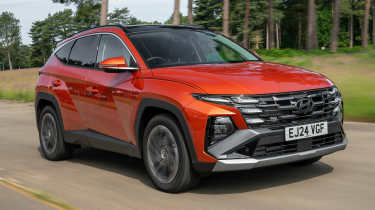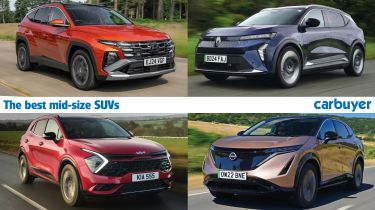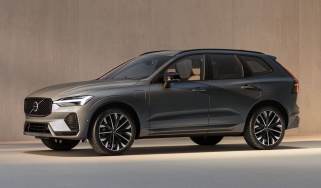Hyundai Tucson review – a great family car


In the last decade, SUVs have really taken off thanks to their unbeatable practicality and comfortable ride that soaks up pothole-filled roads. For most, a mid-size SUV will be the sweet spot, striking a perfect balance between family-friendly size and a wallet-friendly price tag – it’s no surprise, then, that the medium-sized SUV middleground is one of the hottest markets with so many models to choose from.
We’ve tested pretty much every model in the mid-size SUV market and compiled our comprehensive list of the top 10 best on sale. These SUVs will suit a range of budgets, while there’s a wide array of petrol, diesel, electric, plug-in hybrid and hybrid models to choose from to suit your preference.
We’ve reviewed each of these mid-size SUVs considering practicality, efficiency, safety, the driving experience and cost. With all those factors in mind, here are our favourites currently on sale.
If you’re not set on something mid-sized, why not read our list of the top 10 best SUVs for a more general overview of our favourites?
We named the Hyundai Tucson our Best Family Car for 2023, so it’s fair to say we rate it highly. The South Korean brand’s latest iteration of its mid-size SUV has gone slightly more upmarket than the old car, with a striking design and a plush interior with a strong level of standard equipment. All of this comes backed up by Hyundai's five-year warranty – not that you're likely to need it.
No matter if you make short trips around a city, commute, or fly up and down the motorway, the Tuscon is offered with a petrol or hybrid engine to suit your needs. The range-topping plug-in hybrid model provides a pure-electric range of around 30 miles, however, we think the self-charging hybrid model is the sweet spot of the range as this offers plenty of punch and can return almost 50mpg on the combined WLTP test cycle.
|
Pros |
Cons |
|
|
If you’ve read any of Carbuyer’s ‘Best Cars’ lists, you’re likely to have seen several Skoda models; this is because the Czech brand’s cars typically offer a fantastic blend of quality, practicality and value. The Enyaq is Skoda’s first-ever electric SUV and shares many of its underpinnings with the Volkswagen ID.4. However, despite costing a chunk less than the VW, the Enyaq offers more space, a plusher interior and even a greater electric range.
There are several models to choose from, with the range being topped by the hot vRS model which boasts 295bhp. We reckon the entry-level 60 model will suit most buyers with its ample 246-mile range and lots of standard kit. If you plan to travel long distances often, the 85 can manage over 330 miles on a charge, while there’s also an Enyaq Coupe model if you’d like to trade a bit of practicality for extra style.
|
Pros |
Cons |
|
|
The Renault Scenic name may be familiar to you, but the latest iteration has little in common with Scenics of old. What was once a popular MPV has been replaced by an electric mid-size SUV, but don’t be put off – we think the transition has made the Scenic a better car than ever before.
The SUV body doesn’t just look stylish from the outside – it allows for a spacious cabin, with room for five occupants to travel in comfort, along with all their gear in its huge 545-litre boot. Thanks to the EV platform, the Scenic has a completely flat floor in the rear, meaning there’s space for tall passengers to stretch their legs. Things are nice up front, too. The driver and infotainment displays are large and clear with slick graphics, while there are physical controls for important functions.
Driving the Scenic couldn’t be easier thanks to a smooth 217bhp electric motor that’s more than powerful enough for everyday driving. The real highlight is the Scenic’s 388-mile range, which beats the figures of most of its rivals.
|
Pros |
Cons |
|
|
Priced from around £28,000
The Skoda Karoq will appeal if you like the sound of the electric Enyaq’s spacious interior and well-made cabin, but aren’t quite ready to make the switch to an EV. The Skoda Karoq was facelifted in 2021 and boasts a smart design and an even smarter cabin, in terms of the clever features that are on offer. Skoda’s optional VarioFlex rear seats can recline, fold and slide to prioritise passenger or boot space, while hidden umbrellas in the doors are incredibly handy on a rainy day.
For such a comfortable car, the Karoq is surprisingly good to drive on a twisty road. While most family SUVs offer some kind of electric or hybrid assistance, Skoda’s offering instead utilises fuel-sipping petrol and diesel engines to keep costs down. Our pick of the range is the 148bhp 1.5-litre TSI petrol as this offers punchy performance as well as low running costs for private buyers.
|
Pros |
Cons |
|
|
Priced from around £52,000
Audi’s first affordable EV – the Q4 e-tron – was an impressive follow-up to the original Audi e-tron and e-tron GT when it launched in 2021. Using the same platform as the Volkswagen ID.4 and Skoda Enyaq, it stands apart from those EVs with an upmarket interior and a classy, conservative exterior design.
Available as a traditional SUV or with a sleeker ‘Sportback’ roofline, the Q4 is offered with a 77kWh battery and a choice of rear or four-wheel drive. Most models can achieve over 300 miles of range, but whichever you pick, you get the same comfortable ride and smooth power delivery. The cabin is really where the Q4 e-tron outshines its competition, however. It strikes an excellent balance between style and functionality, using physical buttons for frequently-used controls alongside a crisp infotainment screen and Audi’s Virtual Cockpit. While boot and rear passenger space is good in isolation, the cheaper Skoda Enyaq pulls ahead in this area.
|
Pros |
Cons |
|
|
The Lexus NX is definitely worthy of your attention if you’re looking for a luxury mid-size SUV. With plenty of space inside and a generously-sized 521-litre boot, it’s also pretty practical. This figure is identical regardless of which powertrain you go for, so whether you opt for the standard hybrid or plug-in hybrid model, you won’t have to sacrifice any luggage room.
Standard self-charging hybrid models get a 2.5-litre petrol engine combined with two electric motors, for a 0-62mph takes around 8.7 seconds in the front-wheel drive version and 7.7 seconds in the all-wheel drive model. Go for the range-topping NX450h+ all-wheel drive plug-in hybrid and you’ll get 302bhp with a 0-62mph time of 6.3 seconds. The plug-in model is also capable of an electric range of up to 40 miles according to Lexus.
|
Pros |
Cons |
|
|
The BMW iX1 is an electric mid-size SUV adapted from the BMW X1 petrol model. While it’s not as fun to drive as the model with the combustion engine, the iX1 offers the lower running costs associated with electric power. Its subtle styling and classy image could also help it slot quite easily into an SUV buyer’s life.
The iX1’s driving experience will be more enjoyable for keen drivers than that of its rivals – it has direct steering and agile handling, and uses a dual-motor four-wheel drive setup to produce lots of grip. The iX1 has 309bhp, meaning it’s very quick from a standing start, doing 0-62mph in just 5.7 seconds. Despite being based on the brand’s entry-level X1 SUV, the model is surprisingly spacious. The boot is a respectable 490-litres – bigger than that of the Mercedes EQA and even beating those of slightly bigger SUVs such as the Nissan Ariya and Toyota bZ4X. The iX1 has an electric range of up to 272 miles from a full charge of its 64.7kWh battery, which should be plenty for most EV drivers.
|
Pros |
Cons |
|
|
Say what you like about Tesla, but Elon Musk’s electric car brand still produces some of the best EVs you can buy. Based on the top-selling Model 3 saloon, the Model Y features a jacked-up 4x4-esque stance and all the benefits of a proper SUV such as a bigger boot and lots of passenger space. Like the Model 3, the Model Y’s interior is incredibly minimalist – sometimes to its own detriment – with a huge and incredibly responsive 14-inch touchscreen dominating the dashboard.
While top-of-the-range Performance models often get all the headlines due to their sports car-rivalling acceleration, Tesla introduced an entry-level rear-wheel-drive version of the Model Y in 2022 which makes the most sense for the majority of buyers. This can do a reasonable 283 miles on a single charger and thanks to Tesla’s extensive Supercharger network, you’ll never be pressed in finding somewhere to plug in.
|
Pros |
Cons |
|
|
The Kia Sportage underwent a radical redesign in 2021, introducing new bold exterior styling making the old car look tame by comparison. On the inside, the Sportage is equally revolutionary, thanks to plenty of tech borrowed from the futuristic Kia EV6. The dual 12.3-inch screens found in ‘3’ trim cars and above are a particular highlight, while lower-spec cars still benefit from plenty of standard kit. The Kia Sportage’s boxy shape means it’s incredibly spacious, with a 587-litre boot that should easily swallow all your family’s luggage.
The new Sportage shares many of its parts with the latest Hyundai Tucson. Though the ride is slightly firm, there is a wide range of petrol and diesel engines to choose from which all vary in levels of electrification. Plug-in hybrid models can manage over 40 miles of range using electric power, while cars with the 1.6-litre mild-hybrid petrol engine can return respectable fuel economy of around 44mpg.
|
Pros |
Cons |
|
|
The Nissan Ariya is the second fully-electric car from the Japanese brand after the Leaf, and its first ever electric SUV. It’s much more upmarket than the Leaf was, featuring a class-leading cabin that’s minimalistic but elegant with a wooden finish on the dashboard, as well as interior ambient lighting which pays homage to Japanese Andon paper lanterns, for a relaxing atmosphere.
While it’s not the most practical mid-size SUV on this list, it does feel very spacious inside and there are clever features like a sliding centre console to free up more legroom in the front or rear. The Ariya’s 466 litres of boot space should still be adequate for most buyers, especially if you’re looking to upgrade from the Nissan Leaf. The Ariya features a range of up to 329 miles with the largest 87kWh battery, although the smaller 63kWh unit that came later launched with a 250-mile range and a more affordable price tag.
|
Pros |
Cons |
|
|


New Smart #5 Brabus is a 637bhp far cry from the brand’s city car past

Best car leasing deals 2025: this week’s top PCH offers


